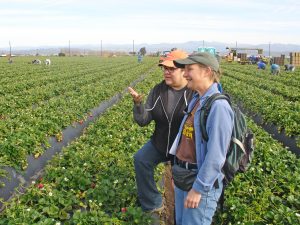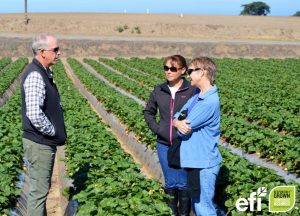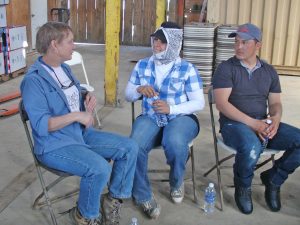Meet the People Behind EFI: Margaret Reeves, PANNA Scientist, Founding EFI Board Member
 Margaret Reeves, senior scientist for the Pesticide Action Network of North America (PANNA), has been involved with Equitable Food Initiative (EFI) since the first conversations to create the program began in 2010. She assisted in the creation of the pest management standards, which were first published in 2013, and became a board member when the EFI multi-stakeholder governing body was created in 2015.
Margaret Reeves, senior scientist for the Pesticide Action Network of North America (PANNA), has been involved with Equitable Food Initiative (EFI) since the first conversations to create the program began in 2010. She assisted in the creation of the pest management standards, which were first published in 2013, and became a board member when the EFI multi-stakeholder governing body was created in 2015.
Reeves brings decades of experience working on farmworker justice issues in Latin America and the United States as well as her expertise in soil ecology and sustainable agriculture policy and practice to the board.
We asked Reeves about how EFI’s pest management standards were created and how they support farmworkers.
There’s no greater potential to have significant positive impacts on the lives of many, many farmworkers than through what EFI offers.”
– Margaret Reeves, Senior Scientist, PANNA
What is it about the work of EFI that you find most compelling?
That I can combine both my interest in making agricultural production more sustainable, socially and environmentally, and also the promise that EFI has a positive impact on the lives of hundreds of thousands of workers is very compelling. My interests in agro-ecology and sustainable agriculture aren’t generally addressed by large-scale industrial Ag, but the potential to have a positive impact on the lives of so many farmworkers is most compelling in that context.
What is a normal day at PANNA for you?
Partnering with outside groups and other Pesticide Action Network staff around California and nationally on different campaigns ranging from sustainable agriculture policy to policy development and implementation for better farmworker protections from exposure to pesticides — those are the two big areas that I work on.
In my role as staff scientist at PANNA, I work with scientists, organizers and communications experts to transcribe the scientific literature and prepare materials in support of various campaigns or campaign work. We basically transcribe the key points from scientific literature in service of the public policy changes we want to see happen.
In my work at PANNA, collaboration with partners is key. EFI is also exactly that—it’s working with diverse partners to achieve common goals. But in the case of EFI, we’re actually talking not about addressing public policy, but about company or grower policy.
 Can you talk about the early planning and thought that went into developing EFI’s pest management standards? What was that process like?
Can you talk about the early planning and thought that went into developing EFI’s pest management standards? What was that process like?
Well, it’s a huge task to look at regulating, modifying and restricting the use of pesticides, which have become a key tool in industrial-scale agriculture. By design, these chemicals are made to kill pests, yet we don’t want them to harm workers or the environment, including having negative impacts on soil health — because there’s nothing more fundamental to productive, vibrant sustainable agricultural production than the health of the soil on which it’s based.
Regarding the standards, we initially thought, “Let’s take some of the low hanging fruit and ban some of the worst of the worst pesticides, just like some other standards have done.” It quickly became clear that that approach wasn’t going to work because there are literally tens of thousands of chemicals out there.
Many of the other standards that have those kinds of prohibitive lists are generally focused on consumer exposure — reducing residues on produce for consumer health — but our focus at EFI is the workers in the field. So that model of coming up with some prohibitive list because it will better protect consumers was not going to satisfy our need to first and foremost protect the health and well-being of farmworkers. And that’s why we shifted to an emphasis on the process of crop and soil management to reduce the need for the use of hazardous pesticides and focus instead on an integrated pest management (IPM) approach.
What about implementing IPM practices surprises growers who are new to it?
IPM is nothing new. It was the norm in United States well into the ’70s. For any of the growers coming into EFI who look at the standards and see IPM, probably 99% say, “Oh OK, we do that to some extent anyway.”
But, definitions of what it means to practice IPM vary. IPM as it is intended in the EFI Standards is very information intense, which is what can make it difficult. It means that growers, pest control advisers, and ideally the workers in the field, have much more information about the ecology of the plant-soil-insect world — so that they can make decisions to avoid pest and disease problems before they happen.
Hence, first and foremost in the IPM approach is prevention. If you do end up with a pest or disease situation that requires intervention, you’ve got a list of tools to use, the last of which are the hazardous pesticides. So you use these other tools including extensive monitoring of pest populations to determine if and when they actually pose an economic threat, cultural controls such as field sanitation to remove diseased material, biological controls, “softer” chemicals like those approved for organic production and as a very, very last resort use some of the more harsh chemicals.
By implementing IPM on EFI-certified farms and requiring the more deliberate focus on understanding the ecology of the system and doing everything you can to prevent pests and disease, we hope that EFI farms compared to non-EFI farms will demonstrate a reduced use of hazardous pesticides.
 As a long-time advocate for farmworker rights, can you speak from your experience about what makes EFI’s approach to improving the lives of farmworkers effective?
As a long-time advocate for farmworker rights, can you speak from your experience about what makes EFI’s approach to improving the lives of farmworkers effective?
The training is phenomenal. EFI has a great team of bilingual trainers (and if necessary speakers of more languages). The creation of the on-farm Leadership Teams that represent all aspects of the workforce is designed to provide voice and agency to the workers on the farm, including all the different jobs on the farm, including gender representation and including representation from different geographic regions or cultures (for example, different indigenous cultures). Seeing the teams in action has been very impressive, and the stories from the workers are powerful, as they tell of the positive impacts of EFI on the workforce better than any of us board members could.
The focus of EFI is on large-scale industrial production of fruits and vegetables because that’s where we can have the greatest potential to reach the greatest number of workers. So, even though environmentally there are some big challenges in large-scale monoculture production, in terms of farmworkers, there’s no greater potential to have significant positive impacts on the lives of hundreds of thousands farmworkers than through what EFI offers.

